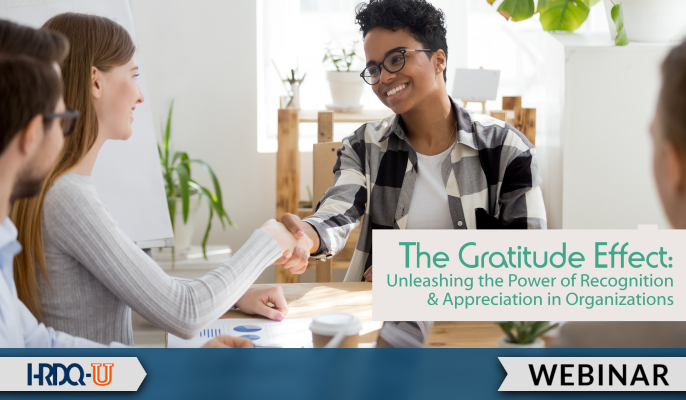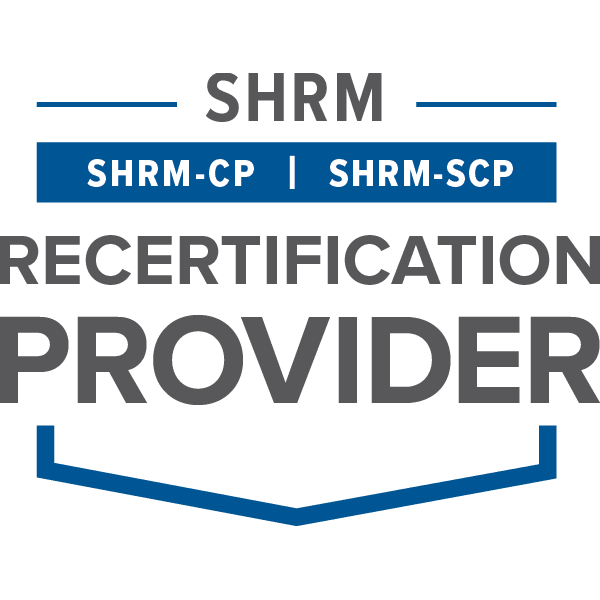- 827 Lincoln Ave. #B-10 West Chester, PA 19380
- support@hrdq.com
- +1-610-279-2002
Quick Links
Menu
Featured Topics
Menu
Total Results
We could not find what you're looking for. Please try again.No Record Found

Many workplaces understand the power of acknowledgment in the workplace. But the most enlightened organizations are taking gratitude and recognition and rewards a step further. By operationalizing gratitude at work, they are seeing measurable improvements in engagement, retention, safety, and productivity. That’s because gratitude, when given frequently and crowdsourced, changes not only the receiver but also the giver.
In this webinar, The Gratitude Effect: Unleashing the Power of Recognition & Appreciation in Organizations, see how some of the most admired global companies in the world achieved eye-popping ROI through case studies supported by science. Leaders who know how to cultivate positive emotion tap into an endless well of psychological capital – hope, optimism, confidence, resilience, and belief – that has the power to keep people and teams innovating, creating value, and more successful even in tough times. Attend and learn the real, tangible, and actionable steps to building a better workplace culture, using a proven method for culture change.


Devin C. Hughes is an author, speaker, consultant, executive coach, and an internationally recognized expert in the science of happiness, organizational/culture change and leadership development. He has lectured and worked with a variety of Fortune 100 companies, as well as the Secret Service, the IRS, and an assortment of profit and nonprofit organizations. Devin is the author of 20 books and has lectured in more than 15 countries. He lives in San Diego, California, with his wife, four daughters, and two rescue dogs.
Connect with Devin on Facebook, Twitter, Instagram, and at www.devinchughes.com.
Training Tools for Developing Great People Skills
This event is sponsored by HRDQ. For 45 years HRDQ has provided research-based, off-the-shelf soft-skills training resources for classroom, virtual, and online training. From assessments and workshops to experiential hands-on games, HRDQ helps organizations improve performance, increase job satisfaction, and more.
Learn more at HRDQstore.com

Sign up to be notified of upcoming live webinars, in-depth workshops, podcasts, blog posts, promotions and much more. Stay ahead of the curve and subscribe for FREE today!
7 Responses
Question: You can’t force the special moments or recognitions. How do you address it when these moments and recognitions are forgotten?
Answer: No, you just need to be more thoughtful about it. And so again, I would say do you have space to think about other opportunities, again, to think about when you could create some of these moments, like, for example, Memorial Day is this weekend? On Friday? I don’t know I can’t I don’t know your team. I don’t know what they value. But there’s some opportunities to let people different people know, create a moment that they’ll matter. Again, I’ll give you an example, which is easy. How you start your meetings and how you end your meetings is as important as what happens during the meeting. How do you start your meeting and you start with good news? Do you end with good news? Don’t think big, hairy and audacious moments. There’s a little micro moments that you can clearly encapsulate to let people know I always start meetings with good news. I want people to feel good. If we’re not talking about the good news is like it doesn’t exist.
Question: What do you find have the best impact on new hires?
Answer: I believe that in reference to welcoming them, so what a couple things here with me onboarding starts from when they initiate the process to come on to the organization. Every inflection point where they have to engage with your organization is an opportunity for a makeover. So as soon as they submit, submit, resume, talk, every interview, all of that is potential opportunity for a makeover. And or I would argue that the onboarding should not last the day, it should last six months, a year? What are you going to do I have to 12 months to let that person know that they’re a big deal that has a very short shelf life now, every day is not going to be the same. But on day 31, or 61? Or 91? What are we going to clearly let that person know that they’re a big part of a team. And so we’re I’m expanding the onboarding process to let people clearly know because in the first 30 days, or 45 days of a new job, you still don’t have to figure it out. You’re still trying to find your bearings. So think about that there’s an opportunity with all those inflection points, to just change the narrative a little bit and let them know they matter. I’ll give you an example. Performance reviews. Again, it’s a nuance I used to do my performance reviews via the walk when I was in a climate that was warm. Why? If I walk with you, what does that clearly suggest? This suggested that this relationship matters. Most of the things we do at work we’ve inherited, what I’m suggesting there’s some things you can do to bring some humanity back to the workplace. And that’s just one example.
Question: How do you influence the negative Nellies?
Answer: Well, human beings aren’t born negative. It’s a learned behavior. I haven’t found too many people who come to work intentionally be negative. In most cases, it’s just been normalized. We use language like well, that’s just Sarah B. And Sarah, Teddy being petty. No. And so I sit down and have one on one conversations and talk about, again, with the again also depends on your line of sight. Are you their boss or your peer? What’s the relationship, it can feel awkward to have one of these crucial conversations, whether you or others need to let people know, again, what their behavior and some of the collateral damage now everyone that I work with tends to care about their performance for the most part, if they don’t, they probably shouldn’t be on the team. So I tend to try to find something that they value. And once I find that, then I can have a conversation that connect the dots, and let them know that the behavior they’re exhibiting at work may be an impediment to achieving the goals they want. There’s a variety different ways but those aren’t easy conversations.
Question: What is your opinion on work life balance?
Answer: You know, that depends on how you define it. Now again, I would argue this in situational Steven, conversations with your team. If you’re a leader or part of a team, you need to define what it looks like. I mean, how many of you right now check email on the weekends? How many of you check it after? 6pm? How many were sneaking it getting up early on vacation, checking email, all the above? So you don’t you have a lack of boundaries on organizations that I work with and work for and can’t boil the ocean, but on your team on your team? For example, could you agree on some social norms that work for you? In other words, we’re not going to email after six o’clock or the expectation is if I send an email after six, you don’t have to have the obligatory check it before Monday morning late. And I’m going to create some group norms to group a little bit of sanity. And or if it’s mission critical, Steven, then we’ll build a work around a contingency plan. But these are the kinds of conversations that have to happen. Otherwise, you’re going to have people email in all times of the night and weekends. And if you don’t reply, then you feel like oh, again, these are great conversations in the new normal.
Question: Gail would like to know what is your opinion about how one’s EQ influences their awareness of and capability to express gratitude?
Answer: Absolutely, it matters. It influences their awareness and their capability. I mean, emotions, see, we get a game we’ve been taught that we’re thinking machines that feel that is incorrect. We’re feeling machines that think we feel everything. And if you want to create a workplace where human beings can thrive, you need to operationalize more of these positive emotions. And EQ is absolutely critical to that. And having conversations like that is absolutely critical. We can’t discount that. We feel everything.
Question: How can we develop a better inner circle?
Answer: Yeah, so the inner circle again? Are we talking professional or personal? And again, I’ll answer both. I’m just very, very careful about who I allow in my airspace. If people at work are not congruent, or exhibiting the kind of behaviors and mindsets that I want that I just sometimes have to cease and desist hanging around them. I don’t judge them. But if they’re gossiping about people, guess what? I don’t participate. I removed myself. Because emotions are contagious. And it’s the same thing in your personal life. Either people are pouring into your cup, or they’re putting holes in your cup. Just be very careful about who you allow in your airspace.
Question: Do you need to have a full cup before you can fill another person’s?
Answer: I mean, I ideally, yes. But in the real world, our cups not always full. So I would suggest that if you have something in the cup that you can share with others, certainly. But that’s why I’m very intentional about filling my cup every day. Some days, it’s hard. Sometimes I feel like people are pouring my cup over putting holes in my cup. But I’m very intentional about filling my cup so I can pour into others.